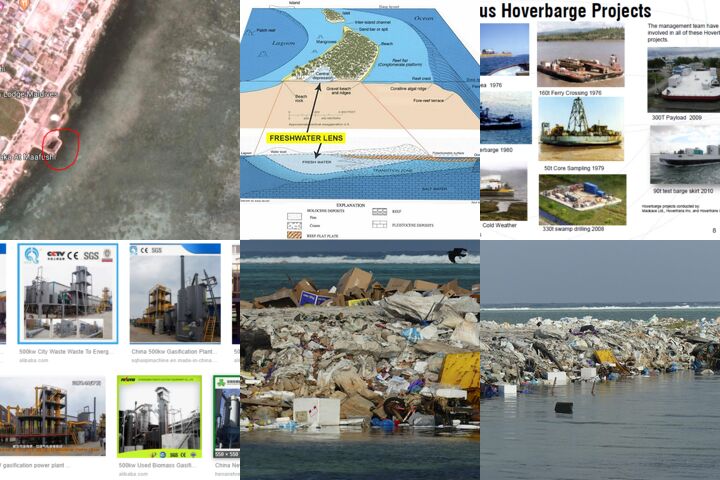Island Landfill Sites 2.0
The Problem
Islands often have small and badly controlled land fill sites and rubbish dumps - see attached pictures from the Maldives They lose waste into the sea in storms. This project would empty and improve the sites. Islands also often have very restricted water supplies and rely on fresh water that accumulates in 'water lenses' - see diagram Rain water accumulates in the lens and is accessed by wells or boreholes. This water supply is small and very fragile. On some tropical islands - particularly the more densely populated - water pressure is severe. Kiribati is a particularly sad case. This problem is exacerbated when uncontrolled rubbish dumps and rubbish burning contaminates the water lens Island communities also suffer from power supply issues and frequently rely in diesel generators. Diesel is very expensive in these communities as it has to be delivered by boat. It can be 4 times more expensive than diesel on the mainland.
Our Proposal
A small, state of the art power generating garbage incinerator would be taken by barge to the site. Garbage would be dug out of the land fill, and any valuable waste recovered for recycling. Unusable waste would be burned and the power generated fed into the island power grid. This would allow existing generators to be overhauled. Excess waste could potentially be converted into diesel by a gasifier installed on the same barge. Once emptied, the site would be properly lined, allowing it to be used for many years to come. The incinerator and gasifier would travel to the next island to work on another dump. One of the challenges would be getting the large piece of incineration equipment to the island landfill site. This may well be on the beach and behind a reef on the inside edge of the lagoon. Access to such a site would be very difficult for a conventional barge, but a hover barge would be ideal for this purpose - see diagram. Equipment weighing tens or even hundreds of tonnes could be transported to the edge of the landfill, operated for a few months and then move onto the next site when the garbage had been safely incinerated and the energy converted to power Waste to energy incinerators of around 500kw are commercially available - see attached photograph. Alternatively, a mother ship with a small group of boats and hovercraft could work their way around small islands with minimal ability to consume power, and just collect the rubbish for processing.
We Assume that...
Funding can be found to empty island land fill sites.
Health concerns from garbage burning and dumping are also a major issue on small islands, as the limited fresh water supply can become contaminated. This is currently not addressed
Constraints to Overcome
Mobile incinerators on barges can be moved between islands in locations such as the Maldives, or Indonesia, where plastic and other waste is a problem amplified by the lack of land for landfill sites. Small islands cannot afford substantial facilities. However, these facilities could be mounted on a ship and travel from island to island, sharing the cost and maximising the benefits. Waste is a significant health hazard on atolls where fresh water and land are in very short supply. Dumped or burned waste contaminates the water supply causing significant sickness in these small communities
Current Work
Emptying the landfill sites on the islands of the Maldives and other island atoll chains. To reduce the release of plastic into the sea. To reduce the exposure of islanders to toxic fumes from waste burning and from toxic leachate
Current Needs
This project is a semi-permanent fix for the isolated communities that are affected. While it has limited global impact, the local impact would be substantial. It would require deployment in combination with a wide range of other solutions but would be the keystone project If this project is selected as one the 20, the funds will be used to prepare a detailed costing of the project and to seek interested partners If the project is selected for larger funding, contact will be established with other regional plastics charities and the Plastics Alliance to make a concerted effort to deploy this project.
